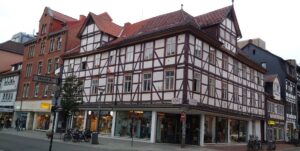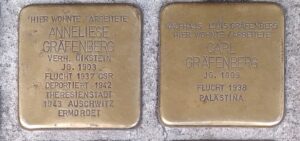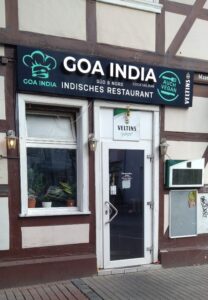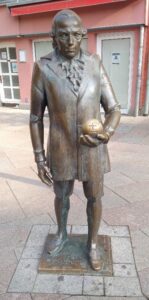Europe Diary 1
Snippets from Goettingen
Germany owed us money. While travelling through Italy, Switzerland, Belgium, Netherlands, France and UK in a hurricane trip in 2013, we booked a Rhine River cruise in Germany which could not be availed of and the amount got forfeited. The scope of recovery arose when our daughter joined a fellowship in the Goettingen University. She kept calling us and finally, after going through a now torturous visa process we landed on Frankfurt on 23rd July this year.
Goettingen’s closest international airport is in Hannover, but Frankfurt is a larger airport with better connectivity. An adjacent train station adds to the convenience. We took a direct train to Goettingen for a two-hour long journey and walked down to our daughter’s rented house at the city centre. The city is lined up with quaint old homes, many of them half-timbered. Often, these houses have small wooden plaques fixed on their outer wall carrying the names (and tenure) of famous people who once resided in those buildings. We could see the name of Benjamin Franklin, the American physicist as well as polymath, Dorothea Schlözer, the first German lady to receive a PhD degree and are still discovering the rest.

Favoured by the famed, 21 Prinzenstrasse is the building where Benjamin Franklin lived in 1766
The urge to preserve of the look of old buildings also amazes a newcomer. ‘Look’, because in most cases the façade is preserved. Everything else behind it is demolished and remodelled. Remarkable sculptures commemorating people and events crop up everywhere. Memories of the Jews who faced persecution are preserved in front of their erstwhile abodes in a seemingly strange way of brass tiles, about 3-inch square on the footpath carrying the names, their tenure in the house and what happened to them. In Goettingen most mention ‘fled’ to some other country.

Many old buildings
Unless a hobby or part of a fitness, the cycle is considered a poor man’s vehicle in India. It is very interesting to see how people from all sections use cycles here. The buses, cars and vans all have arrangements to carry multiple no. of cycles. Beside the ubiquitous cycle, people go everywhere with pets (mostly dogs). Prams, pets, wheelchairs and cycles are freely allowed inside all means of public transport including trains. It is also a common sight to find Perambulator type attachments for the kids and for pets trailing a cycle.

Tablets in memory of Jews in front of their house. Anneliese fled to Czeckoslovakia but could not save herself from being captured and dying in Auschwitz Concentration camp. Carl probably survived in Palestine
There are some funny cultural aspects. It is summer now. From about 6am to about 9pm, the daylight lingers on. The city is very safe. People move around in groups or alone till late at night in scanty clothes. However, there is a very prudish ‘no-no’ attitude about being photographed. Permission is essential. That restricts the tourist from freely capturing the ways of public life through her/his camera.
July and August are time for summer holidays when most Germans go on vacations. The energy situation has worsened due to the Russia-Ukraine war. This year the government issued a subsidised 9-euro monthly ticket for June-July-August to encourage using public transport. The 9-euro ticket covers all non-express trains (S-Bahn) and local bus-tram-Metro (U-Bahn) everywhere in Germany. One who carries this (mostly on individual smartphones) have almost free passage through the country.
Beggars, young or old, are common. They generally sit silently with a hat or empty glass before them. Some are a bit aggressive. They come forward and approach the passers-by. Many beggars have their own pets who sit by their masters. We hear that the number of alms seekers has risen with the Ukraine war. ‘Stop War’ sign displayed on shop window in the neighbourhood, a professor’s family providing shelter to an Ukrainian mother-daughter duo, look intriguing in a country that got involved in two world wars.
Resistance to change is here too. Gottingen is too hot, but the houses have only heating arrangements. Air coolers or fans are mostly absent. The windows too cannot be fully opened. The slanted roofs mostly carry small metal fencing at the edges to break the winter ice into small pieces before falling on the ground. Mosquitoes are rare, so are flies. However, when we went out for two days leaving one window partly open hundreds of flies invaded the house.
There are free ducks in a canal nearby and plenty of pigeons in the city centre. Amid the hustle and bustle of the city centre, loneliness hangs like an invisible thick veil. One sees occasional old men and women bent with age. Their common accompaniment is a wheeled shopping bag holder which works both as support for moving around and for carrying necessary purchases.
Language is a big barrier. Beside the Deutschbahn monthly pass, another essential navigation tool is Google translator with good mobile internet. It can translate a text through camera view or when typed. People enjoy food, especially Indian food. There are many Asian or Indian eateries in this small city.


A touch of Goa in Goettingen The tiny statue of polymath Georg Christoph Lichtenberg (1742-99) at the City Centre
The rise of Germany from the widespread ravages of the world to becoming the top economic power of Europe proves German resilience, but does it also prove their ability to come to terms with their own murky past? Does openness and acceptance of one’s faults helps progress? When my daughter came to Germany, the Alexander von Humboldt Foundation funding her research arranged a study tour where they showed the horrors of concentration camps in great detail along with an interview with a concentration camp survivor. Not only that, the well-preserved concentration camps everywhere give free access to witness the evidences crimes the Germans committed on humanity. This openness is startling.
28th August, 2022 Arijit Chaudhuri

Absulutly delightful description of your stay in Goettingen, Germany.
How coincidence. Your arrived in FF on 23rd. July 22. I too arrived in Germany the same day from Goa by OMAN Air via Muscat. I will try to brief my holidays in Germany with my daughter and her family ( She is a German Citizen). She stay at a place called Morfelden- Walldrorf about 10 KMs away from FF city.
If knowing, probably could plan a meet some where during my stay. I am returning back to Goa on 4th September 22.
Have a nice stay and enjoy in company of your daughter.
Regards.
Bimal Dey.
Thank you so much for liking the post. Sorry to have seen your comments today. Yours was a reachable place, but probably we are destined to meet elsewhere (in Goa?).
Summer is getting over in Germany. The fall colur has not appeared yet, but the sunshine looks weaker and the days shorter.
Regards,
Arijit
Nice reading your travelogue. Germans are largely hardworking, organized and punctual. Not sure to club them as humorous society. They do repent their treatment to Jews during WWII. Hope such holocaust will never happen again as long as the Germans hold themselves open for criticism and give free access to concentration camps. Waiting for more
Thanks for your comments. It is good to see However, I don’t see the German train or bus services being greatly punctual. The country is not easy to navigate for a person who don’t know German. However, the lot we could mingle with here, have a taste for humour. From my daughter’s experience, I gather that one of the Germans’ great strengths is openness in the intellectual arena. The juniormost in my daughter’s department share criticism and laughter with the seniormost in equal ease.
Thanks again.